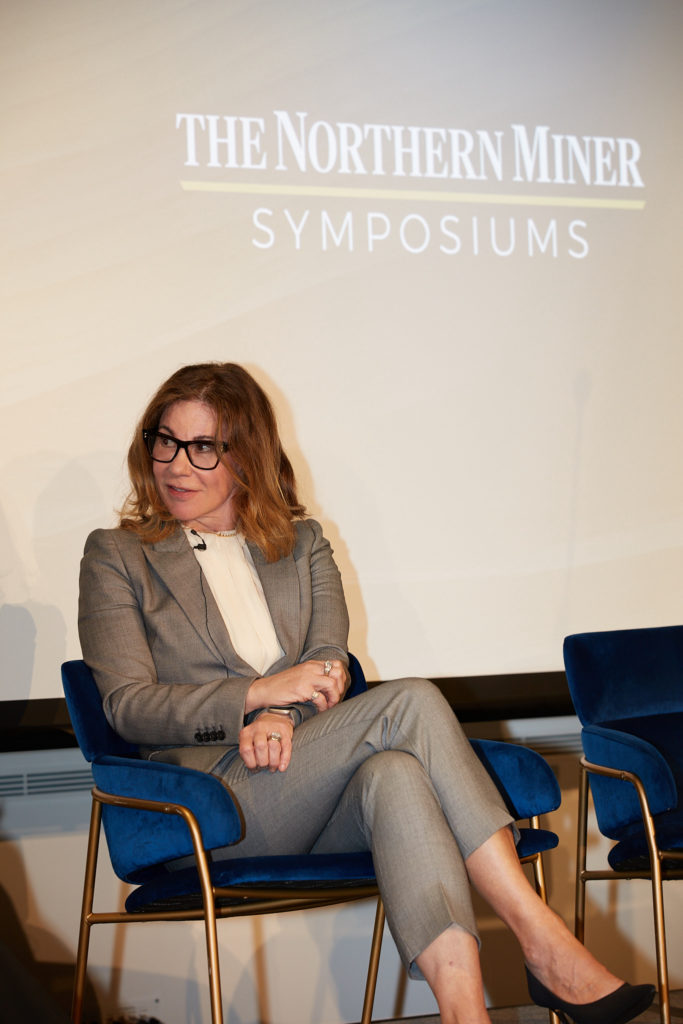CMS: Catherine McLeod-Seltzer blazes a trail from the board room to the drill bit

Among the few women in mining in her early years in the industry, Catherine McLeod-Seltzer often found herself in rooms full of grey-haired men. Yet, she has shattered glass ceilings in the industry, leaving an indelible mark on the global mining landscape.
As the independent chair of Kinross Gold (TSX: K, NYSE: KGC), one of the world’s long-lived gold majors, her story recounts perseverance, vision, and a passion for geology and exploration, The Northern Miner’s Canadian Mining Symposium heard Friday in London. Instead of seeing it as a hurdle, she turned it into an opportunity to be heard.
“Back in 1985, around the beginning of my career, women were not allowed on the floor of the Vancouver Stock Exchange. So much has changed since then,” she told TNM’s Editor-in-Chief, Alisha Hiyate, during a keynote fire-side chat.
McLeod-Seltzer has faced her fair share of challenges at Kinross, from navigating the complexities of the covis-19 pandemic to geopolitical crises like Russia’s invasion of Ukraine. The latter prompted Kinross to pull out of Russia amid international sanctions, costing it about 350,000 oz. of gold production in 2022.
Yet, under her leadership, the company has weathered these storms and found growth opportunities, as seen in the C$1.8 billion ($1.3bn) acquisition of Great Bear Gold’s Dixie project in Ontario.
Early ESG passion
Long before ESG (environmental, social, and governance) became a buzzword in corporate boardrooms, McLeod-Seltzer championed the cause.
With Bear Creek Mining, which she co-founded and chairs, McLeod-Seltzer discussed how the company contributed to the local communities. The company, which struck silver in the southern Peruvian Andes, worked with local women to improve the quality of the alpaca wool they produced and helped them build relationships directly with buyers — cutting out the middlemen and more than tripling their revenues. Because of the company’s social program, local health and sanitation outcomes improved.
She said this clearly demonstrated that mining was not just about extracting resources but also about adding tangible social value.
McLeod-Seltzer believes in the noticeable impact ESG can have on the ground. “It’s an exemplification of how the mining industry, often seen through skeptical eyes, can genuinely transform lives,” she said.
Today, she is a staunch advocate for diversity in gender, race and skill sets. Her straightforward belief is that a diverse boardroom leads to diverse ideas essential for growth and innovation.
“I’ve been a bit of a trailblazer, but I feel like I’m not alone on the trail. There are so many talented women in the industry today,” she notes.
Value via the drill bit
She believes the industry’s natural alchemy of value creation lies in the drill bit.
Drawing from her career successes, she emphasized that the significant leaps in asset valuation come from discovery, referencing instances where mere months of drilling led to exponential share value growth.
Such instances underline her conviction that while subsequent stages, like metallurgical studies and technical evaluations, certainly add worth, they primarily reinforce and underpin the value initially unearthed by the explorer’s drill bit. Her assertion, backed by hands-on experience, underscores the primacy of exploration in mining.
As someone with a finger on the pulse of the industry, McLeod-Seltzer is optimistic about gold’s future. Drawing parallels with the economic conditions of the 1970s, she believes that the precious metal remains an attractive haven, especially amidst current global economic uncertainties.
“I think there’s potential for something to break,” she said. “And when we see that happen, that’s where gold shines.”
{{ commodity.name }}
{{ post.title }}
{{ post.date }}




Comments